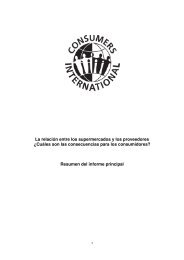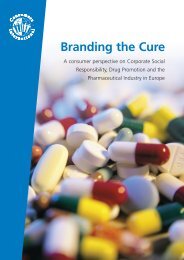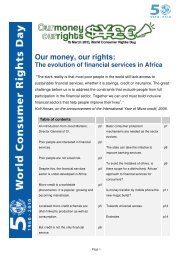Voices for Change: the Consumer Right to Representation
Voices for Change: the Consumer Right to Representation
Voices for Change: the Consumer Right to Representation
You also want an ePaper? Increase the reach of your titles
YUMPU automatically turns print PDFs into web optimized ePapers that Google loves.
World <strong>Consumer</strong> <strong>Right</strong>s Day 2002: <strong>Voices</strong> <strong>for</strong> <strong>Change</strong><br />
only <strong>the</strong> loud protesting groups, but also <strong>the</strong><br />
quieter lobbying groups – in addition <strong>to</strong> <strong>the</strong><br />
global institutions that have now opened doors<br />
<strong>to</strong> hold dialogues with <strong>the</strong>m.<br />
The question of accountability is a far-reaching<br />
one. We must ask it of governments and of<br />
corporations. And we must demand it of<br />
ourselves, as members of civil society and as<br />
consumer representatives.<br />
• It seems simple <strong>to</strong> state that governments<br />
and <strong>the</strong>ir agencies are accountable <strong>to</strong> <strong>the</strong><br />
public because <strong>the</strong>ir citizens vote. But real<br />
accountability requires that <strong>the</strong>se officials<br />
work in <strong>the</strong> best interests of <strong>the</strong>ir citizens.<br />
Can <strong>the</strong>y be called accountable when <strong>the</strong>y<br />
agree <strong>to</strong> a system that puts <strong>the</strong> profits of<br />
trade ahead of concerns <strong>for</strong> health, <strong>the</strong><br />
environment, consumer protections, or<br />
labour conditions? Can governments be<br />
called accountable when <strong>the</strong>y agree <strong>to</strong> <strong>the</strong><br />
onerous and in<strong>to</strong>lerable conditions imposed<br />
on consumers in developing countries by<br />
structural adjustments by <strong>the</strong> lending<br />
institutions?<br />
• The biggest promoters of <strong>the</strong> global<br />
trading system as it exists <strong>to</strong>day are <strong>the</strong><br />
corporations that benefit from it financially.<br />
To whom are <strong>the</strong>y accountable? They should<br />
be accountable <strong>to</strong> <strong>the</strong> broad interests of<br />
consumers, of citizens, of communities. But<br />
<strong>the</strong>y believe <strong>the</strong>y are accountable only <strong>to</strong><br />
<strong>the</strong>ir shareholders and <strong>to</strong> <strong>the</strong>ir bot<strong>to</strong>m line.<br />
They believe <strong>the</strong>y exist only in order <strong>to</strong> make<br />
profits. Most corporations, left <strong>to</strong> <strong>the</strong>mselves,<br />
would not worry about pollution or global<br />
warming or labelling of genetically modified<br />
foods. Or about hunger or health care. Mil<strong>to</strong>n<br />
Friedman has <strong>to</strong>ld <strong>the</strong> world that it would be<br />
wrong <strong>for</strong> corporations <strong>to</strong> consider anything<br />
but profits, and that’s a well-held belief<br />
by business.<br />
• Should civil society organisations be held<br />
accountable in some way? Yes, if <strong>the</strong>y are<br />
per<strong>for</strong>ming services <strong>for</strong> a discreet<br />
constituency. A relief organisation, <strong>for</strong><br />
example, is accountable <strong>for</strong> <strong>the</strong> funds it<br />
receives and disburses. For an educational<br />
or medical institution, consumers want a<br />
certification system and structure that<br />
enables us <strong>to</strong> view <strong>the</strong> outcomes. If <strong>the</strong><br />
organisation wants special status, at <strong>the</strong> UN,<br />
<strong>for</strong> example, some system of establishing<br />
credentials is reasonable. How are consumer<br />
groups accountable? We are accountable <strong>to</strong><br />
<strong>the</strong> consumer movement and <strong>to</strong> each o<strong>the</strong>r,<br />
<strong>to</strong> protect and promote our causes, our<br />
integrity, and our persuasiveness. We are<br />
accountable <strong>to</strong> our subscibers and members,<br />
but how can we increase our accountability<br />
<strong>to</strong> individual consumers?<br />
When civil society organisations express <strong>the</strong>ir<br />
views – whe<strong>the</strong>r in <strong>the</strong> streets or more quietly<br />
within <strong>the</strong> halls of power – <strong>the</strong>y are showing<br />
accountability <strong>to</strong> <strong>the</strong> process of democratic<br />
decision-making. There can be no political<br />
democracy without <strong>the</strong> participation of civil<br />
society. They make a significant contribution <strong>to</strong><br />
defining, protecting and advancing <strong>the</strong><br />
essential values of a democratic, humanistic<br />
society and <strong>the</strong> essential rights of <strong>the</strong> world’s<br />
citizens. Citizen action has advanced <strong>the</strong> grand<br />
march <strong>to</strong>ward political democracy, <strong>to</strong>ward<br />
liberty and <strong>to</strong>ward equality in <strong>the</strong> 18th, 19th,<br />
and 20th centuries. If an activist civil society<br />
didn’t exist, governments would serve only<br />
business, and political democracy would<br />
waste away or be destroyed be<strong>for</strong>e our eyes.<br />
Recently, we saw <strong>the</strong> dramatic contributions<br />
civil society organisations made in <strong>the</strong> fight <strong>to</strong><br />
secure access <strong>to</strong> drugs <strong>for</strong> AIDS victims in<br />
South Africa. Civil society groups were pitted<br />
against <strong>the</strong> power of <strong>the</strong> global pharmaceutical<br />
companies, power that can be even greater<br />
than <strong>the</strong> governments of some developing<br />
countries. But citizen organisations, using <strong>the</strong>ir<br />
expertise, Internet networking and public<br />
in<strong>for</strong>mation skills, and <strong>the</strong>ir implacable<br />
dedication <strong>to</strong> <strong>the</strong> public interest, prevailed in<br />
remarkable ways. When <strong>the</strong> 39 pharmaceutical<br />
companies withdrew <strong>the</strong>ir infamous lawsuit<br />
against <strong>the</strong> government of South Africa<br />
relating <strong>to</strong> AIDS drugs, it was widely heralded<br />
as a vic<strong>to</strong>ry <strong>for</strong> world public opinion. That<br />
vic<strong>to</strong>ry was <strong>the</strong> result of activism by civil<br />
society organisations in <strong>the</strong> <strong>for</strong>efront of <strong>the</strong><br />
fight <strong>for</strong> public health.<br />
<strong>Consumer</strong>s International <strong>to</strong>day is wellpositioned<br />
<strong>to</strong> build on <strong>the</strong> new strengths of<br />
civil society. We have spoken <strong>for</strong>cefully and<br />
15






![pkef]Qmf eg]sf] s] xf] < - Consumers International](https://img.yumpu.com/6479658/1/184x260/pkefqmf-egsf-s-xf-consumers-international.jpg?quality=85)
